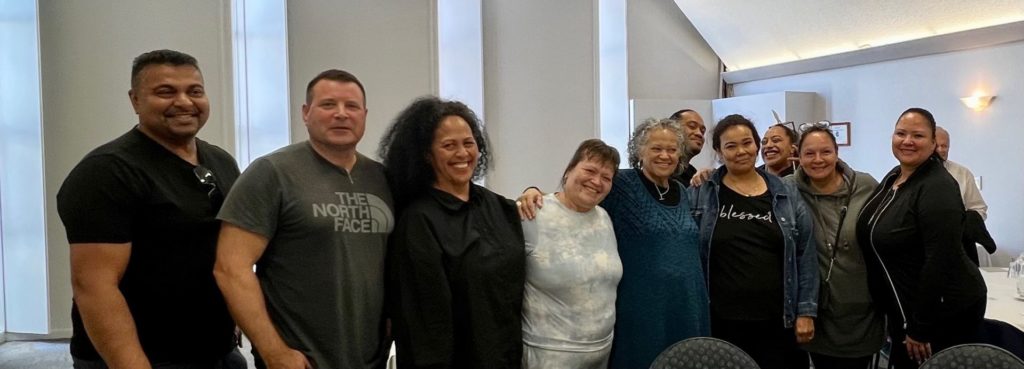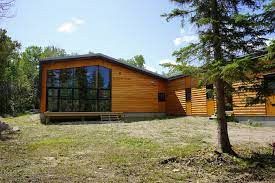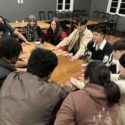A delegation of Indigenous Canadians, working to stamp out violence in their communities and sex trafficking among their women and transgender whānau, arrived in Wellington last week.
They were welcomed to Aotearoa with a pōwhiri by Ngāti Poneke Young Māori Club, Ann Dysart Kahukura Award 2022 winner, Waitomo Papakainga Development Society and E Tū Whānau.
Led by women from the Ma Mawi Wi Chi Itata Centre in Winnipeg, Manitoba, the delegation, which included two police officers and a researcher, spoke of shared experiences, shared solutions, and the sheer joy of deep connection between First Nation Canadians and Māori.

The Ma Mawi way
Ma Mawi Wi Chi Itata translates as ‘We all work together to help one another’. It sums up the Centre’s philosophy perfectly.
Tammy Christensen is a Cree woman from Norway House First Nation. She has been involved in the Centre, in both staff and governance roles, for 25 years and is about to take up the position of Executive Director.
She describes the Centre as being a grounded, stable presence in Winnipeg’s Indigenous community for over 30 years.
“We operate from a passionate belief in the resiliency of our Indigenous families and the uniquely different and natural way we care for one another. We refer to this as the Ma Mawi Way because it holds all the spiritual, mental, physical, and emotional strengths necessary for strong family and community relationships.”
Tammy Christensen
The Ma Mawi Wi Chi Itata Centre was established in 1984 as an Indigenous-led, community-based response to the unacceptably large numbers of Indigenous Canadian children taken into state care. It now operates 50 culturally relevant, prevention- and support-based programmes and services from 18 sites, providing a valued local presence in key neighbourhoods where Indigenous communities live. The sites are located primarily within the city of Winnipeg, home to one of the largest urban Indigenous populations in Canada. There are two sites outside the city.
Ma Mawi has a staff of 200 and over 800 volunteers. They provide families, children, and youth with community-based programmes through three community care centres that connect individuals to a wide range of family resource support services and capacity-building opportunities.
These include five licensed youth care homes, three foster care home programmes for children, a thriving Indigenous youth department with various cultural, training and employment readiness programs, youth leadership development, and several innovative programmes rooted in Indigenous knowledge.
“We truly believe our families have inherent strengths and it is our role to create opportunities to realise these strengths.”
Tammy Christensen
Deep ties
The deep relationship the Centre and its people have with Waitomo Papakāinga started with an exchange of social work students in 1987.
“The students put us in touch with Katie (Waitomo Papakāinga Chief Executive) and her whānau, and life changed for us. The relationship we have with Waitomo Papakāinga is now one of our most meaningful relationships. We’ve become a family,” Tammy says.
The two communities continue to inspire each other by adopting and adapting ideas and practices and building on common experiences as Indigenous peoples in a post-colonial world.
“There is something super powerful about Indigenous people helping other Indigenous people.”
Tammy Christensen
The Centre has successfully introduced the New Zealand’s Family Group Conference (FGC) model to their practice. Members of the delegation will be meeting with Justice and Corrections staff during their visit to deepen their understanding of how FGC works on the ground, especially for Māori whānau.
They’ve also built a lodge inspired by Māori marae in which a Tino Rangatiratanga flag proudly flies.

“The Grey Buffalo Grandfather Wellness Centre is a welcoming place that gives people the opportunity to experience a connection to the land, and to explore and experience Indigenous culture, traditions and ceremonies. Guests have a safe space to hold conference, retreats, training, and meetings,” says Tammy.
Ma Mawi and E Tū Whānau share values and connection
The Ma Mawi Wi Chi Itata Centre bases their mahi on core values which echo those of E Tū Whānau.
Their value statements present ‘a broad and Indigenous view of family that is inclusive of extended family, community and the culture within which we thrive.’Like E Tū Whānau, Ma Mawi Wi Chi Itata whānau envision ‘a safe, healthy, happy and interdependent community’ and work towards it by ‘strengthening children, families and community…. investing in our future.’
Beyond shared values, E Tū Whānau and Ma Mawi Wi Chi Itata Centre also enjoy growing connection. Various members of Ma Mawi presented on their moemoea, whakapapa and mahi at the recent digital Poutokomanawa Hapori Hui 2022. Then, after their Wellington pōwhiri, the Ma Mawi delegation and E Tū Whānau kaimahi enjoyed a morning of whakawhanungatanga that enriched their relationship kanohi ki te kanohi while offering opportunities to share Indigenous approaches to supporting well-being and reducing family violence and harm.
“The E Tū Whānau kaupapa mirrors everything we believe in and understand to be true.
We also believe that our children are sacred, that strong, connected families, enriched by and proud of our wonderful culture, are of fundamental importance to the well-being, resilience and future of our people. This is our heart work.”
Tammy Christensen
Want more?
Read about E Tū Whānau kaupapa, vision, and Mahere Rautaki (Framework for Change) 2019 – 2023
Join the E Tū Whānau communities on Facebook, Instagram and YouTube.



